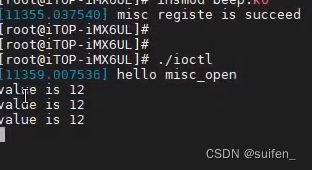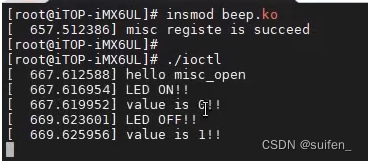Linux驱动学习—ioctl接口
发布时间:2024年01月01日
1、unlock_ioctl和ioctl有什么区别?
kernel 2.6.36 中已经完全删除了struct file_operations 中的ioctl 函数指针,取而代之的是unlocked_ioctl 。ioctl是老的内核版本中的驱动API,unlock_ioctl是当下常用的驱动API。unlocked_ioctl 实际上取代了用了很久的ioctl,主要的改进就是不再需要上大内核锁(BKL) (调用之前不再先调用lock_kernel()然后再unlock_kernel())。
2、unlock_ioctl和read/write函数有什么相同点和不同点
相同点:都可以往内核里面写数据。
不同点:read函数只能完成读的功能,write只能完成写的功能。读取大数据的时候效率高。ioctrl既可以读也可以写。读取大数据的时候效率不高。

3、unlock_ioctl接口命令规则
第一个分区:0-7位,命令的编号,范围是0-255。
第二个分区:8-15位,命令的幻数。
注意:第一个分区个第二个分布主要作用是用来区分命令的。
第三个分区:16-29位表示传递的数据大小。
第四个分区:30-31位代表读写的方向。
00:表示用户程序和驱动程序没有数据传递。
10:表示用户程序从驱动里面读数据。
01:表示用户程序向驱动里面写数据。
11:表示先写数据到驱动里面,然后在从驱动里面把数据读出来。这四个分区的示例图如下:
4、命令的合成宏与分解宏
4.1 合成宏
在include\uapi\asm-generic\ioctl.h
#define _IO(type,nr) _IOC(_IOC_NONE,(type),(nr),0)
#define _IOR(type,nr,size) _IOC(_IOC_READ,(type),(nr),(_IOC_TYPECHECK(size)))
#define _IOW(type,nr,size) _IOC(_IOC_WRITE,(type),(nr),(_IOC_TYPECHECK(size)))
#define _IOWR(type,nr,size) _IOC(_IOC_READ|_IOC_WRITE,(type),(nr),(_IOC_TYPECHECK(size)))
注释如下:
_IO(type,nr)用来定义没有数据传递的命令
_IOR(type,nr,size)用来定义从驱动中读取数据的命令
IOW(type,nr,size)用来定义从驱动中写入数据的命令
_IOWR(type,nr,size)用来定义输一局交换类型的命令,先写入数据,在读取数据这类命令。
参数:
type:表示命令的组成的魔数,也就是8-15位。
nr:表示命令组成的编号,也就是0-7位。
size:表示命令组成的参数传递大小,注意这里不是传递数字,而是传递数据类型,如要传递4字节,就可以写成int.4.2 分解宏
#define _IOC_DIR(nr) (((nr) >> _IOC_DIRSHIFT) & _IOC_DIRMASK)
#define _IOC_TYPE(nr) (((nr) >> _IOC_TYPESHIFT) & _IOC_TYPEMASK)
#define _IOC_NR(nr) (((nr) >> _IOC_NRSHIFT) & _IOC_NRMASK)
#define _IOC_SIZE(nr) (((nr) >> _IOC_SIZESHIFT) & _IOC_SIZEMASK)
注释如下:
_IOC_DIR(nr)是分解命令的方向,也就是上面说30-31位的值。
_IOC_TYPE(nr)分解命令的魔数,也就是上面说的8-15位的值。
_IOC_NR(nr)分解命令的编号,也就是上面说的0-7位。
_IOC_SIZE(nr)分解命令的复制数据大小,也就是上面说的16-29位。
参数说明:
nr:要分解的命令5、实验:在应用层使用命令合成宏和命令分解宏
值得注意的是,内核中使用的合成宏和分解宏与应用层使用的是一样的。其实可以用户和内核空间共用的头文件,里面是ioctl命令的构成和头文件。但本实例在应用层演示其使用,所以就不定义共用的头文件了。
#incldue <stdio.h>
#include <sys/types.h>
#include <sys/stat.h>
#include <fcntl.h>
#include <unistd.h>
#include <sys/ioctl.h>
?
#define CMD_TEST0 _IO("L",0)
#define CMD_TEST1 _IO("A",1)
#define CMD_TEST2 _IOW("L",2,int)
#define CMD_TEST3 _IOR("L",3,int)
?
int main(int argc, char *argv[])
{
printf("30-31 is %d\n",_IOC_DIR(CMD_TEST0));
printf("30-31 is %d\n",_IOC_DIR(CMD_TEST3));
printf("8-15 is %d\n",_IOC_TYPE(CMD_TEST0));
printf("8-15 is %d\n",_IOC_TYPE(CMD_TEST1));
printf("0-7 is %d\n",_IOC_NR(CMD_TEST2));
}6、实验:驱动层和应用层使用ioctl
6.1 驱动层代码
#include <linux/init.h>
#include <linux/module.h>//最基本的文件,支持动态添加和卸载模块
#include <linux/miscdevice.h>//注册杂项设备头文件
#include <linux/fs.h>
#include <linux/uaccess.h>
#include <linux/io.h>
?
#define CMD_TEST0 _IO("L",0)
#define CMD_TEST1 _IO("A",1)
#define CMD_TEST2 _IOW("L",2,int)
#define CMD_TEST3 _IOW("L",3,int)
#define CMD_TEST4 _IOR("L",4,int)
?
ssize_t misc_read(struct file *file,char __user *ubuf, size_t size, loff_t *loff_t)
{
char kbuf[64] = "heheh";
if(copy_to_user(ubuf, kbuf, strlen(kbuf)) != 0) {
printk("copy_to_user error\n");
return -1;
}
return 0;
}
?
ssize_t misc_wirie(struct file *file,char __user *ubuf, size_t size, loff_t *loff_t)
{
char kbuf[64] = {0};
if(copy_form_user(kbuf, ubuf, strlen(kbuf)) != 0) {
printk("copy_form_user error\n");
return -1;
}
printk("kbuf is %s\n",kbuf);
return 0;
}
?
int misc_open(struct inode *inode, struct file *file)
{
printk("misc_open \n");
return 0;
}
?
int misc_release(struct inode *inode, struct file *file)
{
printk("misc_release \n");
return 0;
}
?
long misc_ioctl(struct file *file, unsigned int cmd, unsigned long value)
{
int val = 0;
switch(cmd)
{
case CMD_TEST2:
printk("LEN ON!\n");
printk("value is %d!!\n",value);
break;
case CMD_TEST3:
printk("LEN OFF!\n");
printk("value is %d!!\n",value);
break;
case CMD_TEST4:
val = 12;
if(copy_to_user((int *)value, &val, sizeof(val)) != 0) {
printk("copy_to_user error\n");
? ? ? ? ? return -1;
? ? ? ? ? ? }
break;
}
}
struct file_operations misc_fops={
.owner = THIS_MODULE,//owner 指针指向的就是你的模块
.open = misc_open,
.release = misc_release,
.read = misc_read,
.write = misc_write,
.unlocked_ioctrl = misc_ioctl
};
struct miscdevice misc_dev={
.minor=MISC_DYNAMIC_MINOR,//MISC_DYNAMIC_MINOR动态分配次设备号
.name = "hello_misc",
.fops = &misc_fops,
};
?
static int misc_init(void)
{
int ret;
ret = misc_register(&misc_dev);
if(ret < 0)
{
printk("misc register is error \n");
return ret;
}
printk("misc register is succeed \n");
return 0;
}
?
static void misc_exit(void)
{
misc_deregister(&misc_dev);
printk("misc_exit \n");
}
?
module_init(misc_init);
module_exit(misc_exit);
MODULE_LICENSE("GPL");6.2应用层ioctl函数
和open read write函数同理,当在应用层代码中调用ioctl接口的时候,其实调用的内核file_operations的unlocked_ioctl结构体成员。
#include <sys/ioctl.h>
int ioctl(int fd, int cmd, ...) ;
参数1:设备描述符
参数2:指令,如某一个命令对应驱动层的某一个功能
参数3:可变参数,跟命令有关,传递进入驱动层的参数或者是接收数据的缓存
返回值:成功:返回 0,失败:返回 -1,并设置全局变量 errorno 值6.3应用层代码
#incldue <stdio.h>
#include <sys/types.h>
#include <sys/stat.h>
#include <fcntl.h>
#include <unistd.h>
#include <sys/ioctl.h>
?
#define CMD_TEST0 _IO("L",0)
#define CMD_TEST1 _IO("A",1)
#define CMD_TEST2 _IOW("L",2,int)
#define CMD_TEST3 _IOW("L",3,int)
#define CMD_TEST4 _IOR("L",4,int)
?
int main(int argc, char *argv[])
{
int fd;
fd = open("/dev/hello_misc",O_RDWR);
if (fd < 0) {
perror("open error");
return fd;
}
while (1) {
ioctl(fd,CMD_TEST2,0);
sleep(2);
ioctl(fd,CMD_TEST3,1);
sleep(2);
}
return 0;
}6.4 修改应用层代码,使得用到宏IOR
#incldue <stdio.h>
#include <sys/types.h>
#include <sys/stat.h>
#include <fcntl.h>
#include <unistd.h>
#include <sys/ioctl.h>
?
#define CMD_TEST0 _IO("L",0)
#define CMD_TEST1 _IO("A",1)
#define CMD_TEST2 _IOW("L",2,int)
#define CMD_TEST3 _IOW("L",3,int)
#define CMD_TEST4 _IOR("L",4,int)
?
int main(int argc, char *argv[])
{
int fd;
fd = open("/dev/hello_misc",O_RDWR);
if (fd < 0) {
perror("open error");
return fd;
}
while (1) {
ioctl(fd,CMD_TEST4,&value);
printf("value is %d\n",value);
sleep(2);
}
return 0;
}
文章来源:https://blog.csdn.net/suifen_/article/details/135326084
本文来自互联网用户投稿,该文观点仅代表作者本人,不代表本站立场。本站仅提供信息存储空间服务,不拥有所有权,不承担相关法律责任。 如若内容造成侵权/违法违规/事实不符,请联系我的编程经验分享网邮箱:chenni525@qq.com进行投诉反馈,一经查实,立即删除!
本文来自互联网用户投稿,该文观点仅代表作者本人,不代表本站立场。本站仅提供信息存储空间服务,不拥有所有权,不承担相关法律责任。 如若内容造成侵权/违法违规/事实不符,请联系我的编程经验分享网邮箱:chenni525@qq.com进行投诉反馈,一经查实,立即删除!


